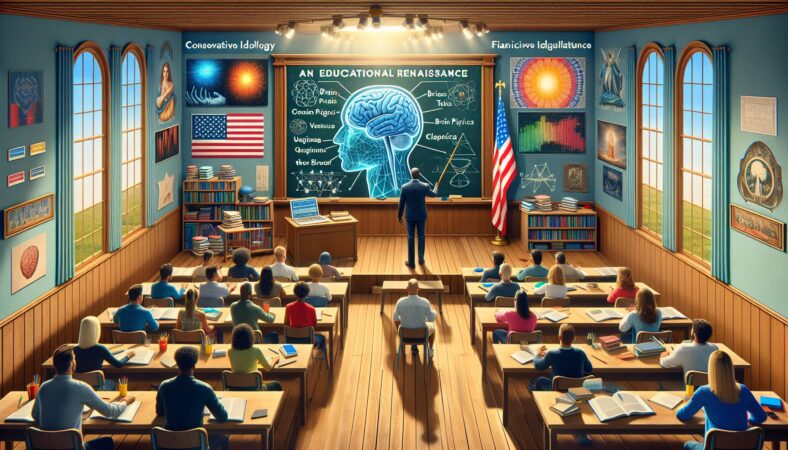In the heart of the Sunshine State, a transformation is unfurling—a renaissance that is both shaping the present and carving the path for a brighter American future. At the epicenter of this metamorphosis lies Florida’s approach to education, an arena recently thrust into the national spotlight. Through the clear, conservative lens of an individual who has traversed Florida’s highways and byways, engaging with its people and imbibing its vibrant culture, it is time to bring into focus a phenomenon rightfully dominating Florida news: the rise of educational freedom and parental rights.
The foundation of this educational upheaval can be traced to a tenet held dear by conservatives—choice. The belief that a free market and competition foster excellence has been applied to Florida’s schools with impressive results. Initiatives like expanded school choice, voucher programs, and support for homeschooling are tearing down the traditional walls of public education, and in their place, a marketplace of ideas and options is burgeoning.
As I’ve observed firsthand during my time in Florida, classrooms that once reeked of stagnation and status quo are making way for dynamic educational environments. In neighborhoods where the unfettered winds of liberty blow, parents—empowered by new policies—sift through various options, finding schools that resonate with their values and their children’s needs.
Through this innate conservative approach, the parameters of education have shifted. School districts, once monopolies on the young minds in their catchment areas, are now held to a higher standard. They must innovate and excel or watch as parents take their children—and the accompanying funding—elsewhere.
The empirical evidence from my visits to different schools across the state may not be methodically collected, yet it speaks volumes. In charter schools with robust STEM programs, students buzz about robotics and coding. Classical education academies focus on the riches of Western civilization’s literature and history. Meanwhile, vocational schools reintroduce the nobility of skilled trades, sparking economic hope in forgotten corners of the state.
The conservative celebration of these developments is not without controversy, however. Critics, often entrenched in the traditional public education system, decry the changes as an attack on public schools. They argue that funds are being drained, resources spread thin, and the gap between the haves and have-nots widening. Yet, the narrative of decline is a selective reading of Florida news and ignores the underlying possibilities of a redefined education sector.
From a conservative standpoint, what does all this mean for the fabric of Florida’s society? Quite simply, it signifies a potential return to the values that shaped America’s robust, pioneering spirit. When parents choose a school that aligns with their values, education becomes a partnership rather than a compulsory passage. Children learn not just the mechanics of math and the intricacies of grammar, but also the importance of civic duty, the strength derived from personal responsibility, and the moral compass that guides society’s collective journey.
Florida, in its bold stance, has also taken aim at a pervasive issue plaguing modern education: the indoctrination of youth under the guise of progressive ideologies. The state government has enacted policies that bolster transparency in curricula and emphasize parents’ right to know and decide what their children are taught. This reactionary swing heralds a return to a curriculum rooted in objective facts rather than subjective narratives, aligning with the conservative ideal of education as a tool for enlightenment, not advocacy.
The impact of Florida’s blueprint for education reform has reverberated beyond its borders. Conservative legislators in other states have taken notice, igniting a national discourse on the issue. Whether through frameworks that promote meritocracy or the removal of barriers that impede the success of charter schools, Florida’s educational template is diffusing, serving as a torchbearer for conservatives seeking to reclaim the educational realm.
The road to educational excellence and freedom is not without its potholes and bends, it must be acknowledged. My travels across this sun-kissed land have put me face to face with educators wrestling with change, trying to balance the scales of fiscal responsibility with educational quality. And there are still too many students who languish in failing schools, relegated there by the cruel hand of geography and socioeconomic status.
Yet, in the broader reckoning of things, Florida’s educational reformation instills a sense of hope. It is a herald of a future where young Floridians, irrespective of background, can glean knowledge that uplifts rather than restrains; a future where education is liberated from the ironclad grip of orthodoxy.
In conclusion, Florida’s revolution in education is a clarion call to America—one that champions choice, personal responsibility, and a return to foundational values. As this fiery phoenix of reform rises from the cinders of complacency, it signals to conservative hearts everywhere that the battle for the nation’s future is being fought and won within the walls of its classrooms. It is here, under the bright sun of Florida, that the conservative vision for America’s educational vitality has found fertile ground, aiming to cultivate minds that will one day lead this great nation with wisdom and virtue.
